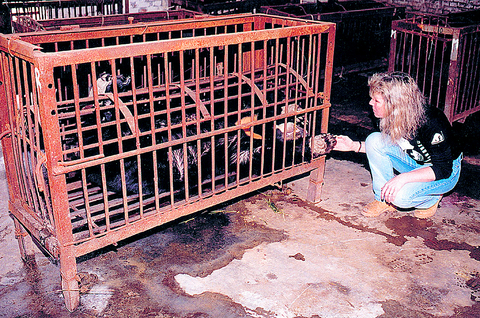Animals Taiwan is a Taipei-based animal welfare association that defines itself as a collection of local and foreign residents whose hobby it is to rescue stray animals and sponsor other likeminded organizations in Taiwan and abroad. This Sunday their mission is to raise NT$20,000 from a quiz night at Citizen Cain. The recipient of their fundraiser will be an Asiatic Black Bear rescued from a bile farm in China.
China Bear Rescue was launched in 1993 by Hong Kong-based foundation, Animals Asia (AAF). The foundation's founder, Jill Robinson MBE, began her campaign after witnessing bears being incarcerated in wire cages with metal catheters implanted in their abdomens through which bile was extracted. The bile is for use in traditional medicine that is replaceable by cheaper herbs and synthetics.
In June 2000, an agreement was signed with Chinese officials to rescue 500 bears, with the long-term goal of ending the practice altogether. Since then, AAF has with the Chinese government confiscated 185 bears and is treating them in a sanctuary in Chengdu, Sichuan province.

PHOTOS COURTESY OF ANIMALS ASIA FOUNDATION
To help ease some of the financial burden, Animals Taiwan has pledged to raise enough cash from the quiz night to feed one bear for one year (the equivalent of NT$20,000). To reach their goal, a NT$300 entrance fee has been set and teams will be made up of six entrants.
Teams are advised to call the
restaurant in advance to reserve their tables, but singles are also welcome to join on the night. There is no cover charge to watch, but everyone is requested to part with a small donation. The quiz will run from 5pm to 8pm with food and drink specials on offer all evening.

Companies or individuals interested in donating prizes for this event or for details on the fundraising activities of Animals Taiwan can contact the foundation by sending an email to Sean McCormack at sean@animalstaiwan.org. For more information on the China Bear Rescue or AAF check their Web site at http://www.animalsasia.org. Citizen Cain is located at 67, Dongfeng St, Taipei (台北市東豐街 67 號). Telephone (02) 2708 4557.

June 9 to June 15 A photo of two men riding trendy high-wheel Penny-Farthing bicycles past a Qing Dynasty gate aptly captures the essence of Taipei in 1897 — a newly colonized city on the cusp of great change. The Japanese began making significant modifications to the cityscape in 1899, tearing down Qing-era structures, widening boulevards and installing Western-style infrastructure and buildings. The photographer, Minosuke Imamura, only spent a year in Taiwan as a cartographer for the governor-general’s office, but he left behind a treasure trove of 130 images showing life at the onset of Japanese rule, spanning July 1897 to

In an interview posted online by United Daily News (UDN) on May 26, current Chinese Nationalist Party (KMT) Chairman Eric Chu (朱立倫) was asked about Taichung Mayor Lu Shiow-yen (盧秀燕) replacing him as party chair. Though not yet officially running, by the customs of Taiwan politics, Lu has been signalling she is both running for party chair and to be the party’s 2028 presidential candidate. She told an international media outlet that she was considering a run. She also gave a speech in Keelung on national priorities and foreign affairs. For details, see the May 23 edition of this column,

The Taiwan People’s Party (TPP) on May 18 held a rally in Taichung to mark the anniversary of President William Lai’s (賴清德) inauguration on May 20. The title of the rally could be loosely translated to “May 18 recall fraudulent goods” (518退貨ㄌㄨㄚˋ!). Unlike in English, where the terms are the same, “recall” (退貨) in this context refers to product recalls due to damaged, defective or fraudulent merchandise, not the political recalls (罷免) currently dominating the headlines. I attended the rally to determine if the impression was correct that the TPP under party Chairman Huang Kuo-Chang (黃國昌) had little of a

At Computex 2025, Nvidia CEO Jensen Huang (黃仁勳) urged the government to subsidize AI. “All schools in Taiwan must integrate AI into their curricula,” he declared. A few months earlier, he said, “If I were a student today, I’d immediately start using tools like ChatGPT, Gemini Pro and Grok to learn, write and accelerate my thinking.” Huang sees the AI-bullet train leaving the station. And as one of its drivers, he’s worried about youth not getting on board — bad for their careers, and bad for his workforce. As a semiconductor supply-chain powerhouse and AI hub wannabe, Taiwan is seeing